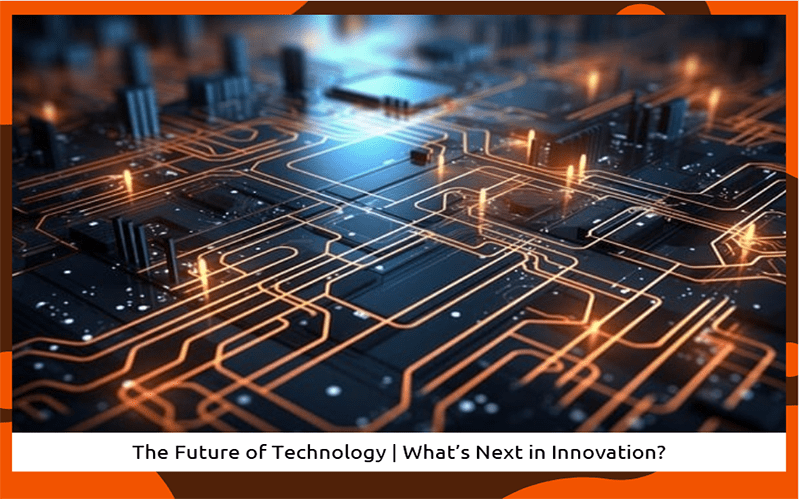The future of technology is exciting. Every day, new inventions appear. Devices are smarter. Networks are faster. And life is more digital than ever.
But what comes next? Will robots work alongside us or replace us? Could machines become companions? The truth is, the future of technology is full of surprises.
Artificial intelligence is changing how we work. Smart gadgets are changing how we live. 5G networks are connecting the world instantly. And new innovations are happening faster than we imagine.
Our daily environments are changing fast. Houses, workplaces, and even entire cities are becoming smarter.
Vehicles, gadgets, and tools are starting to understand human habits. Slowly, the boundary between humans and machines is fading.
So, are you ready? Let’s explore how the future of technology is reshaping our world, one innovation at a time.
The Rise of Smart Technology
We live in a smart world now. Phones, watches, and fridges learn from our habits. Technology is no longer just a tool — it is a companion.
Smart devices adapt to routines. Thermostats adjust temperatures automatically. Watches track heart rate, sleep, and activity. Even homes can switch lights on or off based on movement.
IoT, AI, and cloud computing drive this revolution. Devices communicate with each other. They make life easier and more efficient.
In healthcare, smart devices monitor patients remotely. They alert doctors if there is a problem. AI can analyze scans quickly and accurately.
In education, AI tutors personalize lessons. Students get help where they need it most. In retail, smart systems predict what you want before you ask.
Even cities are getting smarter. Streetlights adjust brightness based on traffic. Public transport systems communicate with each other to reduce delays.
Smart technology is personal and proactive. It learns, adapts, and anticipates. The future of technology is more connected, safer, and more intuitive than ever.
AI and Automation — Powering Progress
Space missions are becoming smarter every day. Robots and systems can process huge amounts of data quickly.
Artificial intelligence and automation are transforming the world. Machines can think, learn, and act, as highlighted in Redefining Space Exploration Through AI-Powered Autonomy. In space exploration, this means rovers can make instant decisions.
They navigate Martian terrain, detect hazards, and even choose the best path forward — all without waiting for humans.
AI analyzes huge amounts of data quickly. Automation converts that knowledge into action. Together, they make life more efficient.
Hospitals use AI to detect diseases early. Factories use automation for precise production. Schools use AI to create personalized learning. Farms use smart systems to grow better crops.
Machines handle repetitive work. Humans focus on creativity, problem-solving, and strategy. This combination is at the heart of the future of technology.
Artificial intelligence is changing the way we talk and interact. Smart assistants respond immediately to our requests.
Language translation apps break down barriers and bring people together. Meanwhile, automated systems handle repetitive tasks, cutting mistakes and saving time.
The journey is just beginning. AI and automation expand human potential. They are engines driving the future forward.
The Next Big Wave — 5G, Quantum Computing, and Beyond
The next wave of technology is reshaping connection and computation.
5G is more than fast internet. It enables real-time connections. Smart cities, self-driving cars, and virtual reality will thrive on this network. Streaming, gaming, and online work will feel instantaneous.
Quantum computing is a leap forward. Normal computers solve problems step by step. Quantum computers explore millions of possibilities at once. This technology can revolutionize medicine, climate research, and logistics.
Biotechnology is also growing rapidly. Scientists create new treatments using smart algorithms.
Nanotechnology builds tiny machines that can repair cells or deliver medicine. Space tech allows exploration and research far beyond Earth.
Every innovation opens new doors. The future of technology is fast, limitless, and full of opportunities.
Human Touch — Technology with Heart
Even the smartest technology cannot replace human emotion. Machines can act, but only humans can feel.
Smart assistants detect tone in voices. Apps notice mood patterns. Still, empathy, warmth, and connection remain human qualities.
Balancing technology with compassion is key. Machines handle logic. Humans provide purpose. This balance makes innovation meaningful.
In healthcare, AI may diagnose, but only humans provide comfort. In education, AI tutors guide learning, but teachers inspire creativity.
The future of technology empowers humans. It is not about replacement but collaboration. The smartest technology understands human needs and emotions.
The Road Ahead — Shaping Tomorrow
Tomorrow’s world will be smarter, more connected, and sustainable. Flying cars, AI-powered doctors, and eco-friendly cities are coming.
The choices we make today will shape tomorrow. Will we build tools that care for people? Will we protect the planet? These questions matter.
Innovation is exciting, but purpose is essential. Technology should enhance life, not just speed it up. Step by step, humans and machines can achieve what once seemed impossible.
The future of technology is ours to create. Dream big, innovate smart, and act with heart.
Frequently Asked Questions (FAQ)
We have learned some interesting things about the future of technology. Now, let’s look at some important FAQs to understand it better.
Human creativity combined with AI, smart devices, and global connectivity drives innovation.
Many repetitive tasks will be automated. Humans will focus on creativity, leadership, and problem-solving.
Yes. Green energy, smart cities, and eco-friendly innovations are shaping a cleaner, safer planet.
Mostly yes, but it also requires careful use and smart decision-making.
The unknown! Every new innovation opens doors to possibilities we cannot yet imagine.
Conclusion
The future of technology is happening now. Every invention changes how we live. Machines are smarter, networks faster, and devices more intuitive.
The real power lies in using technology wisely. Creativity and compassion together make it a force for good.
We cannot just watch the future. We must build it. Step by step, idea by idea. The future of technology is ours to shape.

